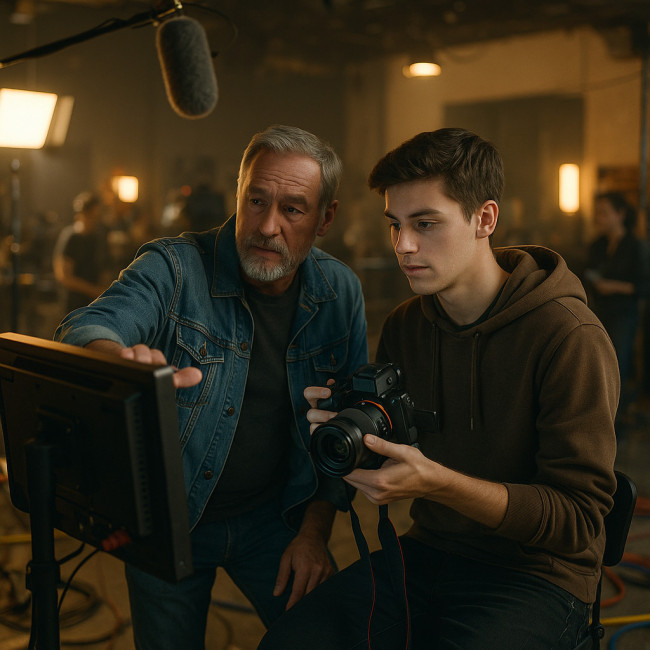Mentorship for videographers: finding and pitching to experienced filmmakers
Looking for a filmmaking mentor but unsure where to start? This guide shows you how to spot the right professionals, craft a pitch they notice and build a relationship that accelerates your videography career.
Why mentorship matters in 2025

Self-study keeps you up to date, yet a seasoned filmmaker shortens the learning curve dramatically. Surveys from LinkedIn Learning show creatives with mentors increase their billable rates by 22 % within a year and land higher-budget projects 30 % faster than peers who learn solo. Mentorship also opens doors to specialised gear labs, on-set shadowing and referral networks that an online course can't replicate.
Where to find the right filmmaking mentor
1. Map your growth objective first
- Niche mastery – e.g., drone cinematography or colour grading.
- Business scaling – pricing, upselling, hiring crew.
- Creative direction – storytelling, pitching concepts to agencies.
Clarifying the objective helps you filter candidates who can genuinely move the needle.
2. Six high-yield channels to locate mentors
- Film festivals & industry markets – attend Q&A sessions and approach filmmakers whose style matches your goal.
- Professional online groups – private Slack or Discord communities focused on cinematography often have mentor channels.
- Local workshops & masterclasses – hands-on events create natural rapport you can nurture afterwards.
- Talent directories – browse senior profiles on videography training resources and request mentorship instead of a production gig.
- Creative coworking spaces – many rent studios to veteran directors who appreciate eager assistants.
- Strategic cold email – highly targeted messages (see templates below) still convert 12 % of the time.
Preparing a pitch that impresses experienced filmmakers
Craft a razor-sharp value statement
Mentors invest time in people who bring clear value. Outline one skill you already master (e.g., gimbal operation) and how it saves them time on set. Point to proof: a portfolio sequencing strategy that shows polished reels in 30 seconds or less.
Essential pitch assets
| Asset | Why it matters | Tip |
|---|---|---|
| 30-second showreel | Shows quality and niche focus instantly | Embed captions for silent viewing |
| One-page skills sheet | Saves mentor from scanning your CV | Highlight equipment you own |
| Learning objective list | Proves you have a roadmap | Limit to three goals |
| Availability calendar | Speeds scheduling | Use shared Google or Notion link |
Looking to refine proposals further? Study our guide on writing a compelling collaboration proposal to tighten structure and tone.
Dos and don'ts when pitching
- Do reference a specific project of theirs that inspired you.
- Do offer tangible help (B-roll capture, second-unit edits).
- Don't send generic copy-paste messages.
- Don't ask for paid work in the same email—focus on learning first.
Email template & follow-up rhythm
Below is a concise structure adaptable to most outreach channels. For more detailed copy, review our cold outreach scripts.
Subject : Your doc “Hidden Cities” inspired this drone operator—idea to assist on next shoot
Hi [Name],
Your long-take sequence in the market scene from “Hidden Cities” sharpened my own approach to stabilised tracking shots.
I specialise in DJI Ronin setups (sample reel : 30 s). I'm aiming to master narrative pacing in handheld work and would value shadowing you for two days on any upcoming shoot. In exchange I'll capture behind-the-scenes clips for your socials and handle data wrangling.
My calendar is open 10–14 May. If useful, I can jump on a 15-minute call next week.
Thank you for considering.
— [Your Name]
Follow-up cadence : one polite reminder after seven days, then circle back only when you have fresh, relevant news (festival selection, gear upgrade, new reel).
Maximising the mentorship once accepted
Set measurable milestones
- Agree on a learning goal per month (e.g., first colour-graded short by June).
- Schedule micro-tasks—scene breakdowns, shot-list reviews.
- Track progress in a shared document and request feedback in bullets, not paragraphs.
Exchange value continuously
- Offer free location scouting or social-media snippets for the mentor's brand.
- Share fresh trends such as local SEO tactics they might have missed.
- Introduce them to crew you trust—sound mixers, motion-graphics artists.
Document takeaways
Keep a project journal noting new gear settings, troubleshooting steps and storytelling insights. These notes become future blog content and differentiate your expertise when discussing market trends.
Common pitfalls and how to avoid them
- Scope creep – define limits: number of monthly calls, on-set days.
- Lack of reciprocity – continually ask “How can I lighten your workload next week?”
- Skipping reflection – schedule a bi-weekly review to log wins and gaps.
- Ghosting after goal fulfilment – maintain the relationship by sharing your successes; mentors love impact stories.
Quick knowledge check
FAQ
- Should I pay a mentor?
- Many veteran filmmakers mentor for free when they see reciprocal value, but paying for structured sessions can accelerate access and commitment.
- How many mentors should I have at once?
- One primary mentor keeps feedback coherent; occasional chats with specialists (sound, colour) add depth without confusion.
- Can I ask my mentor for paid gigs?
- Wait until you've proven reliability. When a project aligns with your skills, offer support, but accept their decision gracefully.
- What if my mentor becomes unavailable?
- Agree on a three-month review window. If schedules clash later, transition to quarterly check-ins and seek an additional guide.
Conclusion: your next step
Mentorship transforms isolated learning into targeted career momentum. Identify the filmmaker who complements your goals, send a concise pitch and commit to measurable growth. Ready to put theory into action? Explore potential mentors inside the videography training resources directory today and book your first discovery call.











